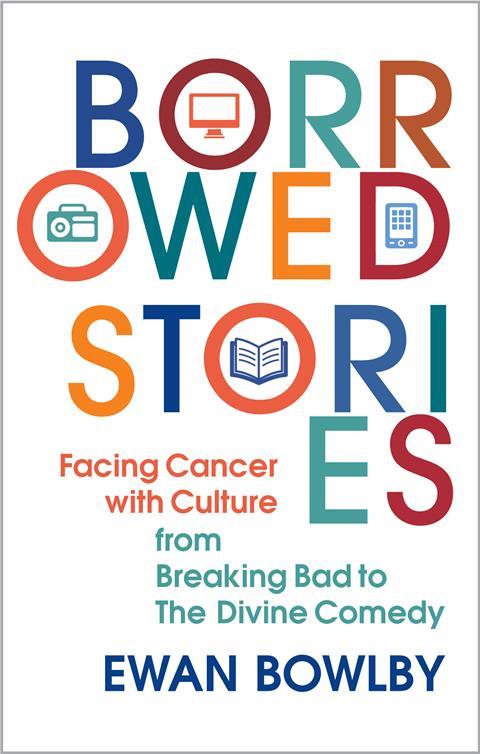Completed after his death and drawn from his PhD thesis, Ewan Bowlby’s Borrowed Stories explores how the arts can help patients find meaning and hope in the face of cancer

Ewan Bowlby died at 27, a decade after being diagnosed with brain cancer. Borrowed Stories Facing Cancer with Culture – from Breaking Bad to The Divine Comedy (Darton, Longman & Todd) is adapted from his PhD thesis on arts-based spiritual care, awarded to him shortly before his death. Ewan began the book himself, but when time ran out it was completed by his father. The result is a profound testament to one young scholar’s determination to help others navigate terminal illness through cultural engagement.
In deeply personal writing, Bowlby exposes the limits of contemporary medicine in addressing spiritual concerns. Western healthcare often prioritises biochemical cures over soul care, leaving patients dissatisfied with a system that monetises time and sidelines emotional needs. Because doctors are reluctant to be seen as giving up, the focus remains on saving lives rather than salving souls. The result is that many patients feel adrift in a system with little space for their spiritual and emotional realities.
Bowlby’s autobiographical account of his brain cancer diagnosis and treatment forms both the emotional core and the springboard for his thesis. The scars left by surgery were not only physical but also deeply emotional, driving his search for ways to process feelings and make sense of his experience. He found that listening to other people’s stories – and borrowing fragments of them – helped him build his own meaning and regain some sense of control over an uncontrollable situation.
This experience shaped Bowlby’s central thesis: that communities and culture offer stories capable of illuminating dark moments and guiding us through pain.
He illustrates this with carefully chosen examples from books and films, showing how the arts can speak to the unique challenges of living with cancer.
Bowlby’s examples mirror the experiences of many cancer patients. Take the TV series Breaking Bad: Walter White’s rage at his diagnosis and desperate attempts to control his legacy echo the anger patients often feel at their stolen futures. For Bowlby, the series validates anger as a legitimate, understandable response to illness rather than something to be suppressed.
Cancer Ward and The Fault in Our Stars both explore the temporal disorientation that follows treatment – the sense of ‘lost time’, disrupted plans, and being trapped in endless cycles of suffering. Those awful, empty days that feel wasted are captured with empathy by Solzhenitsyn and John Green, offering patients the reassurance that they are not alone in such experiences.
The Bucket List follows two terminally ill men who break out of their cancer ward determined to experience life fully before death. This comedy has a curious power: it fosters a defiant acceptance of reality and serves as a fantastic protest against the limits of worldly existence. Accessible films like this can also help fill the long gaps in life where boredom might otherwise take over.

Through these and other examples, Bowlby shows how borrowed stories enable patients to release emotions, bond through shared tears, and uncover consoling meaning in their experiences. His approach offers genuine therapeutic value, especially for those navigating medical systems rich in technical expertise but poor in emotional or spiritual care.
However, the book’s secular framework comes with significant limitations. Bowlby argues that in today’s diverse, secular patient population, Christian salvation has lost relevance for many, making spirituality a contested term that means different things to different people. In doing so, this perspective tends to downplay eternal and transcendent concerns.
For many facing terminal illness, the deeper question is not only whether stories can provide comfort, but whether they offer hope beyond death. Bowlby’s approach largely overlooks prayer, the peace of God’s presence, and the divine promises of life after death that profoundly shape many patients’ experiences of illness and mortality. While his methodology helps people feel less alone and more understood, it does not fully grapple with the divine or with ultimate questions of eternal significance.
Nevertheless, Borrowed Stories makes an important contribution to holistic cancer care, offering practical tools for patients and caregivers to process difficult emotions through cultural engagement. Healthcare professionals will find valuable insights into the spiritual and emotional needs of patients – areas that medical training often overlooks. The specific examples Bowlby highlights also provide concrete resources that counsellors, chaplains and support groups can readily draw upon.
Yet readers should carefully weigh the worldview Bowlby promotes. His ‘secular spirituality’ does offer genuine comfort and a sense of community, but it rests on the assumption that meaning-making through human stories is sufficient spiritual care. For many, however, this proves inadequate when confronting mortality’s ultimate questions, since belief in life after death profoundly shapes the way life is lived before death.
Borrowed Stories stands as a testament to human resilience and creativity in the face of terminal illness. Bowlby’s courage in transforming his suffering into scholarship that serves others deserves deep respect. His work demonstrates how the arts can be vital tools for the emotional and psychological dimensions of spiritual care that contemporary medicine too often neglects. Yet a more complete approach is needed – one that harnesses the arts not only to process experience, but also to engage the transcendent dimension many consider essential when facing mortality’s ultimate questions.






































No comments yet